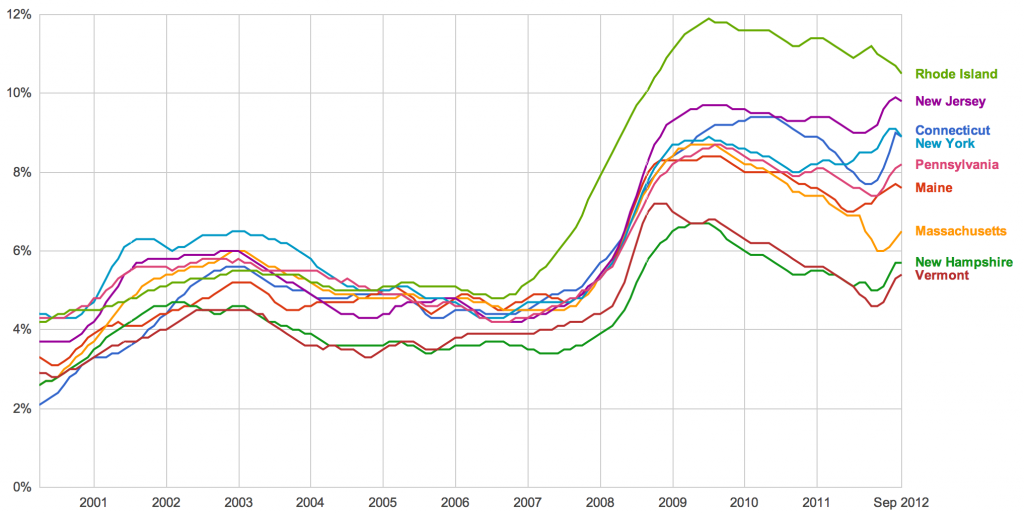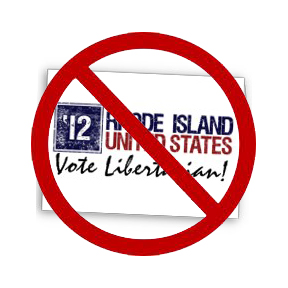
RI Escapes the Northeast’s Regional Recession


Progressive News, Opinion, and Analysis

 The 2012 elections have been seen by many as a bold refutation on the part of voters to extreme religious conservatism: marriage equality made big strides in four states, women’s rights took a small step forward as the Senate is now comprised of 20% women and reproductive rights were supported as voters saw fit to reject Aiken, Mourdock and others who said unbelievably objectionable things about rape and abortion.
The 2012 elections have been seen by many as a bold refutation on the part of voters to extreme religious conservatism: marriage equality made big strides in four states, women’s rights took a small step forward as the Senate is now comprised of 20% women and reproductive rights were supported as voters saw fit to reject Aiken, Mourdock and others who said unbelievably objectionable things about rape and abortion.
But the voters also rejected the other half of the Republican Party’s conservative agenda. They have rejected the libertarian lie of the self made millionaire in favor the reality that we all get where we are going with the help of others. While libertarians create elaborate schemes of minimal government and free market utopias, voters in the real world recognize the need for things like infrastructure and education investment.
Here in Rhode Island, voters approved a host of important bond issues. These bond issues are very different in character, but their approval demonstrates that in our heart of hearts, we are a kind and compassionate people who really want to help each other achieve our goals, not a group of ruthless competitors battling it out for supremacy in some sort of Darwinian financial Thunderdome.
Putting aside the first two questions, as to whether or not to expand gambling in the state, we can look at Question 3, Higher Education. 65.5% of voters decided that even in these financially difficult times, Rhode Island College is worthy of $50 million for renovations to key buildings and an expansion of the nursing program. At a time when conservatives are looking to corporatize and outsource education, Rhode Islanders have decided to support public education at a college level, because a commitment to education is a key value.
Question 4, provides funds for a new veterans retirement home. With 77% of the voters approving, this vote shows that we are a people committed to fairness and gratitude. Veterans sacrifice for this country, and one of our great shames is the second class treatment we afford our country’s heroes after they are dismissed from service. Yet this vote shows that we are in fact committed to honoring our debts to these men and women, despite the priorities of the politicians and bureaucrats who prioritize our veterans differently.
Question 5 deals with clean water, and since everyone wants that, the vote, with 73.2% approving, could be interpreted as being selfishly motivated. $20 million is to be spent on waste water facilities and drinking water infrastructure, but the Clean Water Finance Agency also provides low-interest loans for communities and utilities to undertake improvements. Rhode Island is of course proud of its amazing drinking water, and caring for this vital resource is a gift to future generations, as well as to each other.
Speaking of gifts to future generations, Question 6 concerned environmental management, and 69.3% of voters approved. Local recreation projects, open space and farmland preservation and improved water quality in the Narragansett Bay will all become realities due to this $20 million bond.
The final ballot measure, Question 7, passed by the lowest margin but with a 60.6% approval the vote wasn’t really close. This bond provides $25 million that will be matched with $225 million from other sources to provide affordable housing. As a strong supporter of and volunteer with Habitat for Humanity, such housing is a real priority for me, and at least 6 out of 10 Rhode Islanders concur, even in, or perhaps especially in, these economically difficult times.
Libertarians believe that education and environmental issues are best solved through the free market. If people want education, they’ll pay their way through private schools. If they want to breathe clean air they will purchase it in containers at the store. If they want large swaths of nature to be protected from development they should save their money and buy it before some developer strip mines it. If veterans want to retire in comfort and dignity they should have saved their money or found employment that paid them more and if people can’t afford decent housing they should live in a box and work harder.
But voters this election cycle, not only here in Rhode Island demonstrated that they don’t really believe in that. Elizabeth Warren, Senator elect from Massachusetts, said it well:
There is nobody in this country who got rich on his own. Nobody. You built a factory out there? Good for you. But I want to be clear: you moved your goods to market on the roads the rest of us paid for; you hired workers the rest of us paid to educate; you were safe in your factory because of police forces and fire forces that the rest of us paid for. You didn’t have to worry that marauding bands would come and seize everything at your factory, and hire someone to protect against this, because of the work the rest of us did. Now look, you built a factory and it turned into something terrific, or a great idea? God bless. Keep a big hunk of it. But part of the underlying social contract is you take a hunk of that and pay forward for the next kid who comes along.
This is the America that most Rhode Islanders believe in. For the libertarian policies to win acceptance by the greater public economic conservatives will need to convince us to turn away from our sense of fairness, our sense of charity and our duty to care for each other and for the future. To achieve their goals, economic conservatives need only to convince voters that the only thing that matters is our own short term self-interest and to reject the very values that best ennoble us.

In a year where there were only four candidates across the state marked as belonging to the Moderate Party on the ballot (most people never saw them and the fifth and sole successful Moderate Party candidate ran in a nonpartisan race), 9249 voters used the so-called “master lever” to vote for the Moderate Party.
With only 971 Moderates registered in the state as of October 1, 2012, the master lever gave the Moderates a 952.52% amplification of what its registration should’ve provided. Moderate chair Ken Block referred to this as “horrific” on Twitter, and proceeded to lay out the case for abolishing the master lever, claiming that 20 potential Moderate candidates didn’t run because of the lever.
While the master lever is a major hurdle to organizing a third party (and its abolition would be good), it was particularly short-sighted of those candidates to refuse to run. For one thing, the more candidates running under a party’s name increases name recognition for the party, translating into more votes. Furthermore, in communities where there were no Moderates, many of those votes were wasted.
Fear of the master lever is no excuse for failing to contest elections, nor is the master lever the sole problem that the Moderate Party has (the same should be said of the Republicans). Abolition of the lever is no guarantee that the Moderates will suddenly see their vote numbers increase (they might actually see the opposite). The best exposure the party got all year was that their name and symbol were at the top of the ballot across the state. Voters are still capable of reading party affiliation, and rejecting the parties whose platforms or candidates they reject.
The Moderate platform, while containing admirable ethics and environmental sections, is essentially the same corporate economic and education systems espoused by Republicans and laissez-faire Democrats: don’t increase taxes, give cash away to unproven businesses and charter schools, rely on unreliable data to measure school progress. This platform is simply not that popular among voters in the core urban areas (the data bears that out, Mr. Block did better in the exurbs during his 2010 run for Governor). I’ve mentioned these criticisms before.
But make no mistake, the Moderates are growing. There were 971 of them on October 1st of this year. Three years ago in 2009 there were only 52 on October 1st. Yesterday, WPRO’s Dee DeQuattro placed their registration at 1068. That’s a pretty substantial increase, about 10% growth in about a month and a half.

The Moderates face a major test in 2014. It sounds as if Mr. Block is not committing himself to running for governor, saying that he has confidence in whatever candidate his party fields to clear the 5% bar to keep the party on the ballot. That’s a good thing. It would be disastrous for the Moderates to be tied too strongly to Mr. Block, merely because if his energy flags or fails, so does the party’s. Though if they can’t find a candidate, I assume the Moderates will put Mr. Block up again rather than let themselves fail.
Hopefully, a new candidate can gain over 5% support, though once again they’ll have to build name recognition. If that candidate doesn’t make 5%, the media is waiting with the narrative: the Moderates were merely moderate Republicans and in 2014 they decided that they didn’t want to spoil a real Republican’s chances. While that narrative may or may not be true, it’s out there, waiting for the Moderates to prove it wrong.
The Moderate Party has a long way to go. Focusing on appealing to voters across Rhode Island and getting candidates is its major work right now (as I’m sure Mr. Block is far more aware of then I am). Then it has to prevent brain drain from its organization (a couple of its alums joined Governor Lincoln Chafee’s administration). But the Moderates have one advantage the Republicans don’t when contesting elections. No one would mistake a Moderate for a Republican.
As an extra, if you avoided the link to WPRO (don’t get stuck in an echo chamber!), Mr. Block had a killer takedown of the RI GOP in the comments:
Dee DeQuattro gets this one all wrong. 6.5% of the vote in a competitive 4-way race starting from zero is a monumental achievement – I am certain the 5% threshold was written into law because few thought it could be done by a brand new party.
Her biggest swing and miss is that RI does in fact need a new political party – because the state GOP has utterly failed for the 2 decades I have lived here to bring political balance to our state. Whether it was the striking out Strike Force or the empty Clean Slate, to a large extent the state GOP has been tone deaf, missing what RI voters really care about.
The State GOP did not get wiped off of the political map in 2012 because of the existence of the Moderate Party. There were no legislative races where a GOP and Mod showed up on the same ballot. The State GOP is flailing all of its own accord – with a substantial boost from the national GOP messaging which works in TX but not so well in RI.
I am always amused by the hand wringing done by stalwarts in the GOP who fret that silly Rhode Islanders keep voting for the same Dem jokers so they deserve what they get. The more appropriate observation should be why does the GOP think that running the same folks with the same failing message will result in a different electoral outcome.
It will not.

If Obamacare’s survival was the biggest policy victory of the election, a close second has to be tax equity. In his first post-election presser, Obama said yesterday the nation needs to ask the richest 2 percent of the population to pony up a few more tax dollars if we’re to avoid a fiscal disaster. Congressional Democrats are in a great position to win this no-brainer before the new year, and we’ve got Senator Sheldon Whitehouse to thank for making this a kitchen sink issue with his Buffett Rule bill of last session.
Our state legislators would do well to follow this lead and pass their own tax equity bill in 2013. Speaker Gordon Fox told me on election night that the conversation has already begun.
Speaking of tax policy, the ProJo editorial board is incorrect when it asserts that state workers are to blame for Rhode Island’s relatively high cost of government. It’s got far more to do with our small size, high density and desire for top notch services and amenities.
But there’s also a larger takeaway from last Tuesday’s election on economic policy. Newsweek/Daily Beat correspondent Michael Tomasky writes:
Trickle-down economics died last Tuesday. The post-election chatter has been dominated by demographics, Latinos, women, and the culture war. But economics played a strong and even pivotal role in this election too, and Reaganomics came out a huge loser, while the Democrats have started to wrap their arms around a simple, winning alternative: the idea that government must invest in the middle class and not the rich. It’s middle-out economics instead of trickle-down, and it won last week and will keep on winning.
ProJo columnist makes a great point about Mike Riley’s sour grapes concession speech in which he blamed the media for the electoral drubbing he took from popular incumbent Jim Langevin. He writes, “Riley did say something wise, but he somehow missed how it applies to his own campaign: ‘Hopefully someday many of you will do very well because of your own hard work. You will have succeeded and you will have failed, but ultimately it will be you — and not somebody else that did it to you.'”
Here’s one way the media mistakenly makes it seem like there is fraud and waste in the public sector: GoLocal reports that 52 percent of state education dollars makes its way into the classroom. “That seems small,” says an advocate for smaller government. But it’s not. Does anyone think Hasbro spends half its resources on manufacturing toys? Or your favorite restaurant spends half of its total revenue on your food? Not if the cost was calculated the way GoLocal looked at ed. funding. The reality is we hold the public sector to a ridiculously high standard, which we should, but we shouldn’t mistake our high standards with inefficiency.
I’m absolutely thrilled to be participating in Journalism Day at URI, my alma mater! I’ll be on a panel talking about news curation, or as the URI journalism department calls it, aggregation. Whatever you want to call it, it’s the art of finding, packaging and adding value to already existing content. It’s a super important component of advocacy journalism in general and media criticism in particular for pretty obvious reasons. It’s also a super important component of beat reporting for the most obvious reason of all: it’s a service to readers. We’ll be discussing whether or not it’s ethical, which I actually think is a question that long ago was settled in the affirmative, but as with most topics, I’m more than happy to have the debate…
 Look around and you’ll notice the era of reefer madness is dying a slow death all over the country. Last week, Colorado and Washington became the first two states to to officially legalize it, as Peter Tosh might say. And yesterday Reason.com, somewhat fittingly, broke the story that RI state Rep. Edith Ajello plans to reintroduce a bill that would legalize and regulate marijuana much like alcohol. Maine is considering doing so too.
Look around and you’ll notice the era of reefer madness is dying a slow death all over the country. Last week, Colorado and Washington became the first two states to to officially legalize it, as Peter Tosh might say. And yesterday Reason.com, somewhat fittingly, broke the story that RI state Rep. Edith Ajello plans to reintroduce a bill that would legalize and regulate marijuana much like alcohol. Maine is considering doing so too.
Oregon rejected a similar measure on election day, and the fairly conservative editorial page of the Oregonian quickly opined that the state legislature should pass the bill lest the state lose out on the business and tax opportunity to Washington – the same logic by which Rhode Islanders decided they didn’t mind casino gambling coming to the Ocean State, saying:
And if business booms at Washington’s pot shops, as expected? Our neighbor to the north will collect millions of dollars in new “sin” taxes, with much of the money coming from Oregonians who’d be happy to keep their business — and taxes — in state if given the opportunity.
There are far more tax dollars to be had by legalizing cannabis than through expanding gambling and the social ills are far, far less. Here’s hoping Rhode Island leads rather than follows on this one.
Here’s a short video of RI Future talking with Rep. Ajello last year about why marijuana should be taxed and regulated rather than remaining the purview of the black market.